Diplomatic Bluebook 2023
Chapter 2
Japan's Foreign Policy by Region
3 Collaboration with European Regional Institutions, and the Asia-Europe Meeting (ASEM)
(1) Cooperation with the North Atlantic Treaty Organization (NATO)
NATO7 is an organization that aims at providing collective defense for its 30 member countries. In addition to defense for its 30 Western member countries, it provides engagement in cooperative security efforts with non-EU countries and organizations and in crisis management outside of the region that could pose a direct threat to the security of the territories and peoples of NATO member countries, including security management and counter-terrorism efforts.
The security environment in Europe has been changing as a result of Russia's aggression against Ukraine since February, as shown by the fact that Finland and Sweden, which had been pursuing a policy of neutrality, applied for NATO memberships. Furthermore, with the existing international order under serious challenge, NATO's interest in the Indo-Pacific region is growing based on the recognition that the security in Europe and the Indo-Pacific are inseparable, and cooperation between Japan and NATO has become even more important (see the Special Feature on page 140).
Amidst this situation, Foreign Minister Hayashi attended the Meeting of NATO Ministers of Foreign Affairs held in April as the first Japanese Foreign Minister to ever do so. He stated that unilateral attempts to change the status quo by force will not be allowed in any region, and that he would like to strengthen cooperation between NATO and its partners in the Asia-Pacific, including Japan, toward realizing FOIP.
Moreover, Prime Minister Kishida attended the NATO Summit in June as the first Japanese Prime Minister to ever do so. During the Summit, he welcomed NATO's expanded engagement in the Indo-Pacific region and expressed his desire to make progress in cooperation in fields such as cyber, emerging technologies, and maritime security. The new NATO Strategic Concept adopted at the Summit clearly states that the Indo-Pacific is a region that can directly affect Euro-Atlantic security, and that NATO will strengthen its dialogue to tackle cross-regional challenges and shared security interests.
In January 2023, NATO Secretary General Jens Stoltenberg visited Japan for the first time in six years and issued a joint statement with Prime Minister Kishida, confirming that Japan-NATO cooperation will be taken to further heights in light of the current security environment. Moreover, during his meeting with Foreign Minister Hayashi, they also exchanged views on the situation in the Indo-Pacific region and shared the view to ensure close collaboration between Japan and NATO.
Japan and NATO have been advancing specific cooperation based on the Individual Partnership and Cooperation Programme (IPCP) (formulated in 2014, revised in May 2018 and June 2020). Japan has been contributing by participating in NATO's Cyber Coalition, dispatching a female Self-Defense Forces (SDF) official to the NATO headquarters, and making contributions to the Partnership for Peace (PfP) Trust Fund. At the June meeting between Prime Minister Kishida and NATO Secretary-General Stoltenberg, it was confirmed that the IPCP will be upgraded to be more suitable for the new era and that the work will be accelerated toward an early agreement on a new document for cooperation.
- 7 North Atlantic Treaty Organization (NATO)
For more information, see the MOFA website for details: https://www.mofa.go.jp/region/europe/nato/index.html
(2) Cooperation with the Organization for Security and Co-operation in Europe (OSCE)
The OSCE is a regional security organization with 57 participating States across Europe, the Central Asia and Caucasus region, and North America, that works to bridge differences between member countries and foster trust through conflict prevention, crisis management, and post-conflict recovery and reconstruction in these regions through a comprehensive approach. Japan has cooperated with OSCE activities since 1992 as an Asian Partner for Co-operation. Japan provides support for preventing terrorism by means such as strengthening border controls in Afghanistan and Central Asia, and also gives support for strengthening the capabilities of customs officials, conducting election monitoring, as well as to projects that promote women's social advancement. Furthermore, the OSCE has been playing an important role in improving the situation in Ukraine even before Russia's aggression began in February. Japan has been providing financial support and dispatching experts to the OSCE Special Monitoring Mission (SMM) (experts were dispatched intermittently since August 2015, and dispatches ended in February 2022).
The year 2022 marks 30 years of partnership between Japan and the OSCE, and the OSCE Asian Partners for Co-operation Group Meeting was held in July to commemorate the 30th anniversary of the Japan-OSCE partnership. At the meeting, State Minister for Foreign Affairs SUZUKI Takako sent a video message, in which she touched on the importance of the international community cooperating together to address the situation at a historic juncture, and stated that Japan will continue to make efforts for realizing peacebuilding. Furthermore, Japan has been attending the OSCE Ministerial Council meetings every year. State Minister for Foreign Affairs TAKEI Shunsuke participated in the OSCE Ministerial Council meeting held in Poland in December. At the Council meeting, State Minister for Foreign Affairs Takei stated that on the occasion of the 30th anniversary of Japan-OSCE partnership, Japan will communicate its contribution to the OSCE region, including Ukraine, and will continue to cooperate with the OSCE.
The year 2022 was a historic year that saw a dramatic increase in the importance of the relations between Japan and the North Atlantic Treaty Organization (NATO).
Russia's aggression against Ukraine that began in February showed anew that the security of Europe and the Indo-Pacific cannot be considered separately.
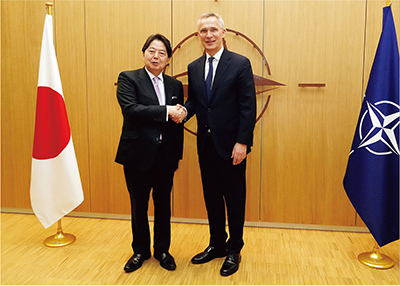 Foreign Minister Hayashi shaking hands with NATO Secretary General Stoltenberg at the Meeting of NATO Ministers of Foreign Affairs (April 7, Brussels, Belgium)
Foreign Minister Hayashi shaking hands with NATO Secretary General Stoltenberg at the Meeting of NATO Ministers of Foreign Affairs (April 7, Brussels, Belgium)NATO is a group of like-minded countries that share the fundamental values of freedom and democracy, which Japan places importance on, and seeks to uphold the international order based on the rule of law. It is precisely because of the aforementioned international situation that cooperation with NATO is very important. Foreign Minister Hayashi was invited to attend the Meeting of NATO Ministers of Foreign Affairs held in Belgium in April, and became the first Japanese Foreign Minister in history to attend the meeting. In his speech, Foreign Minister Hayashi expressed that he would like to strengthen cooperation with NATO toward realizing a “Free and Open Indo-Pacific (FOIP)” in order to establish an international order based on the rule of law, and received strong approval from NATO and its member countries.
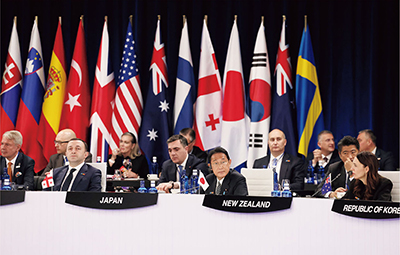 Prime Minister Kishida attending Partner Countries' Session in the NATO Summit (June 29, Madrid, Spain; Photo: Cabinet Public Affairs Office)
Prime Minister Kishida attending Partner Countries' Session in the NATO Summit (June 29, Madrid, Spain; Photo: Cabinet Public Affairs Office)Prime Minister Kishida became the first Japanese Prime Minister to attend the NATO Summit held in Spain in June. In his speech, he touched on the importance of the international community uniting against unilateral attempts to change the status quo by force. He also expressed that he would like to encourage NATO to strengthen its involvement in the Indo-Pacific region, and to develop cooperation in the fields of cyber, emerging technologies, and maritime security. He also spoke of the importance of further unity between Japan and NATO, which are geographically distant from each other. Furthermore, NATO's Strategic Concept was updated for the first time in about 12 years at this Summit, and for the first time clearly mentioned cooperation with the Indo-Pacific region. This was a sign that NATO itself recognizes the importance of cooperation with the Indo-Pacific region in ensuring the security of the North Atlantic and Europe. In addition to Prime Minister Kishida's attendance at the Summit, NATO's way of thinking has majorly changed, making the NATO Summit in June a historic meeting.
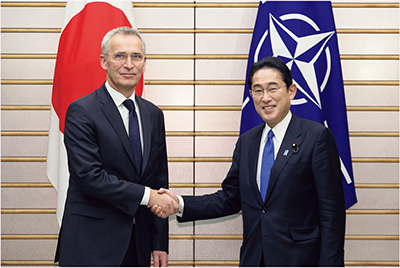 Prime Minister Kishida shaking hands with NATO Secretary General Stoltenberg during his visit to Japan (January 2023, Tokyo; Photo: Cabinet Public Affairs Office)
Prime Minister Kishida shaking hands with NATO Secretary General Stoltenberg during his visit to Japan (January 2023, Tokyo; Photo: Cabinet Public Affairs Office)Moreover, in January 2023, NATO Secretary General Jens Stoltenberg visited Japan for the first time in six years. He released a joint statement with Prime Minister Kishida, and confirmed that Japan-NATO cooperation will be taken to greater heights in light of the current security environment. Specifically, the leaders reaffirmed the importance of further advancing cooperation in cyber and other fields, as well as future cooperation in areas such as critical and emerging technologies, space, and disinformation, as the scope of security coverage expands. Furthermore, during the meeting with Foreign Minister Hayashi, NATO Secretary General exchanged views on the situation in the Indo-Pacific region and agreed on close cooperation between Japan and NATO.
Japan will continue to strengthen Japan-NATO relations, which are dramatically growing in importance within international situation, in order to realize FOIP and furthermore maintain and strengthen the international order based on the rule of law.
(3) Cooperation with the Council of Europe (CoE)
The CoE is an international organization comprising 46 member states in Europe, which has played a key role in establishing international standards in areas concerning democracy, human rights, and the rule of law. Russia, which joined in 1996, was excluded on March 16 following its aggression against Ukraine. As the CoE's sole observer country in Asia since 1996, Japan has contributed to the CoE by providing expertise and supporting the holding of meetings. In May, Japan signed the Second Additional Protocol to the Convention on Cybercrime elaborated by the CoE. Furthermore, Japan participated in the plenary meeting of the Committee on AI (CAI), which aims to draft the world's first AI treaty, and made a policy statement at the World Forum for Democracy in November. Moreover, Secretary General Marija Pejčinović Burić visited Japan in December to participate in the World Assembly for Women (WAW! 2022).
(4) Cooperation through the Asia-Europe Meeting (ASEM)
ASEM was established in 1996 as the sole forum for deepening dialogue and cooperation between Asia and Europe. Its members currently comprise 51 countries and two institutions. It works through summit meetings, ministerial meetings including foreign ministers' meetings, seminars, and other activities focused on three pillars, namely (1) politics, (2) economy, and (3) society and culture.
The Asia-Europe Foundation (ASEF) is ASEM's only permanent institution. It is located in Singapore and is responsible for activities in the field of society and culture, one of the three pillars.
Japan has supported the ASEF with its project stockpiling medical personal protective equipment (PPE) and antiviral drugs to combat infectious diseases, and cooperated in the emergency transportation of stockpiled supplies to ASEM partners, and the implementation of capacity building workshops for emergency response and public health network projects. In September, ASEF stockpiles were provided to Mongolia, and in October, a high-level meeting on risk communication for public health emergencies was held in the UK. Furthermore, under the ASEF's Project for Strengthening Preparedness and Response to the COVID-19 and other Emerging Infectious Diseases, financially contributed to by Japan, drugs, PPE, medical devices and other items to combat infectious diseases were provided through the World Health Organization (WHO) to Ukraine and its neighboring countries accepting Ukrainian displaced persons (ASEM partners: Poland, Romania, Hungary, Slovakia, and Czech Republic; non-ASEM partner: Moldova).
In addition, Japan contributed to the ASEM's activities including through the implementation of ASEF Classroom Network online projects (September through December) as a co-host and its financial contributions to the ASEF.
The international community is now facing a historic shift in the power balance and intensifying geopolitical competition. As some countries can be seen attempting to change the existing international order based on their own historical views and values, it is important for Japan and European countries, which are closely connected with fundamental values and principles, to promote security and defense cooperation transcending the geographic distance between them.
In 2021, there was progress in concrete cooperation between Japan and European countries in the Indo-Pacific. This included port calls in Japan by the French training fleet Jeanne d'Arc, the UK carrier strike group centered on the UK's aircraft carrier HMS Queen Elizabeth, and the German naval frigate Bayern, and the implementation of bilateral and multilateral exercises.
In February 2022, the start of Russia's aggression against Ukraine majorly shocked the international community. The clear violation of the principle of refraining from the use of force, which lies at the heart of the postwar international legal order, by Russia, which is one of the permanent members of the United Nations Security Council, shook confidence in the international order based on the rule of law to its very foundations.
In the face of unilateral attempts to change the status quo by force, Japan and European countries have again come to the strong recognition that the security of Europe and the Indo-Pacific are inseparable, and have taken a step toward further strengthening security cooperation. In April, Foreign Minister Hayashi became the first Japanese Foreign Minister to attend the Meeting of NATO Ministers of Foreign Affairs, and in June, Prime Minister Kishida became the first Japanese Prime Minister in history to attend the NATO Summit Meeting. During the meetings, they shared global security perceptions with NATO and the partner countries and organizations, and concurred to promote concrete cooperation. In October, Japan and Lithuania issued the Joint Statement on Strategic Partnership between the Government of Japan and the Government of the Republic of Lithuania, and newly launched the Japan-Lithuania security policy dialogue. In November, Japan held the second Japan-Germany Foreign and Defense Ministers' Meeting (“2+2”) and confirmed the direction of specific cooperation between the Japan Self-Defense Forces (SDF) and the German Federal Armed Forces. In December, Japan signed the Agreement between the Government of Japan and the Government of the Kingdom of Sweden concerning the Transfer of Defense Equipment and Technology, and also reached a mutual understanding with Italy and the UK on the joint development of next-generation fighter aircraft. This joint development is significant for accelerating the advanced military capability and technological advantage of the three countries, deepening defense co-operation, science and technology collaboration, integrated supply chains, and further strengthening the defense industrial base among these countries.
The National Security Strategy formulated by the Government of Japan in December reiterated that Japan will enhance security cooperation with European countries, NATO, EU and others in order to build a multilayered network among its ally and like-minded countries, to expand it, and to strengthen deterrence.
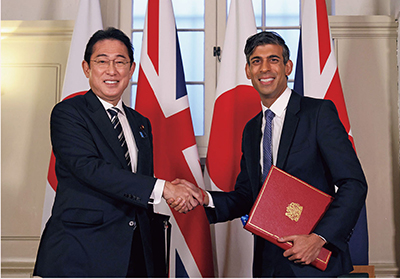 Prime Minister Kishida and Prime Minister Sunak shaking hands at the signing of the Japan-UK RAA (January 11, 2023, London, the UK; Photo: Cabinet Public Affairs Office)
Prime Minister Kishida and Prime Minister Sunak shaking hands at the signing of the Japan-UK RAA (January 11, 2023, London, the UK; Photo: Cabinet Public Affairs Office)In January 2023, Prime Minister Kishida visited France, Italy, and the UK and held meetings with the leaders of these countries. With the UK, Prime Minister Kishida signed the Japan-UK Reciprocal Access Agreement (RAA), which facilitates cooperative activities such as joint exercises and disaster relief between the SDF and the UK Armed Forces. The Japan-UK RAA provides a new legal basis to contribute to more frequent, large-scale, and complex cooperative activities. Furthermore, at the Japan-France Summit Meeting, Prime Minister Kishida welcomed the progress in substantive cooperation, such as reciprocal visits of assets and joint exercises between the two countries, and concurred to deepen bilateral cooperation. Furthermore, with Italy, the two leaders concurred to upgrade Japan-Italy relations to that of “Strategic Partners,” and also confirmed promotion of further cooperation in the security field by launching consultations between the foreign affairs and defense authorities. At the end of the same month, NATO Secretary General Jens Stoltenberg, who visited Japan for the first time in six years, and Prime Minister Kishida released a joint statement and concurred to elevate Japan-NATO relations to new heights.
As partners sharing fundamental values, Japan will continue to further strengthen security and defense cooperation with European countries in order to maintain and expand the free, open, and stable international order.
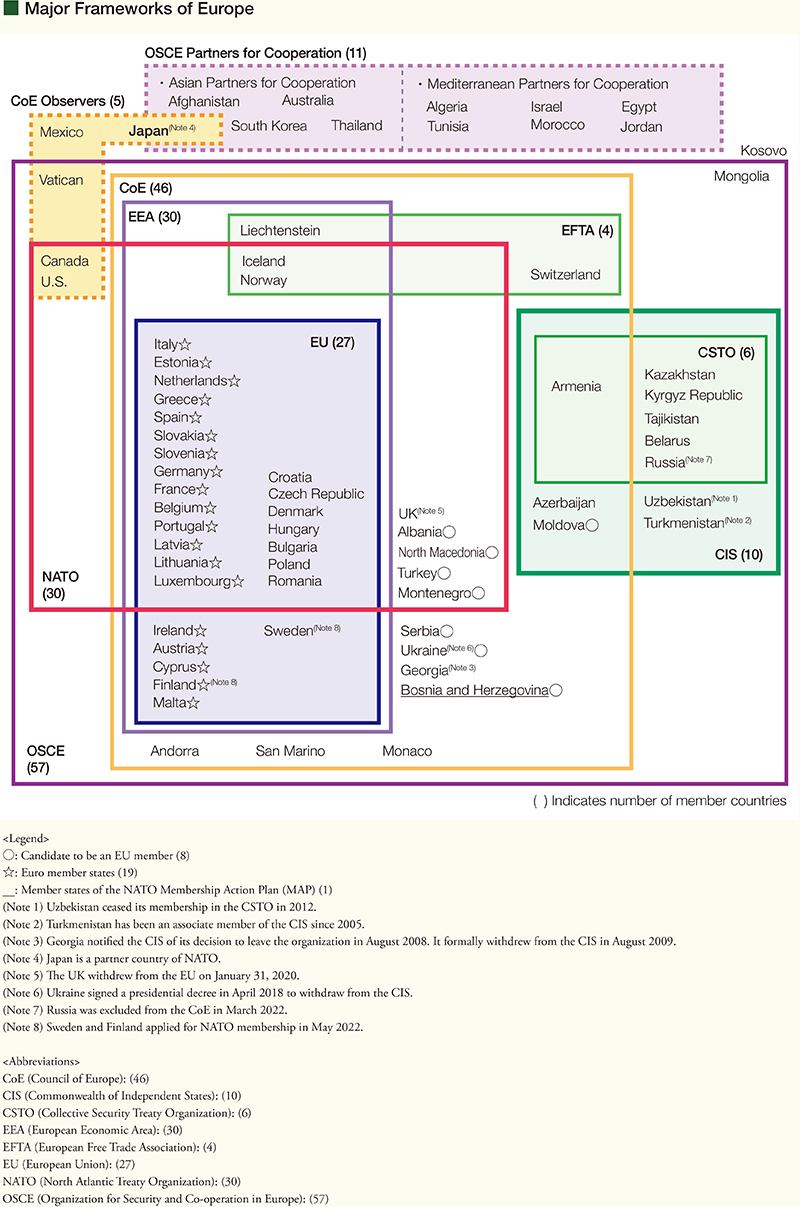
Other European Regions
Nordic countries
Iceland: In December, Prime Minister Kishida met with President Gudni Thorlacius Johannesson, who was visiting Japan to give a keynote speech at the World Assembly for Women (WAW! 2022), and both leaders affirmed they would continue to cooperate on the Arctic issues and on the sustainable use of marine living resources.
Sweden: In June, Prime Minister Kishida, who visited Spain to attend a NATO summit meeting, held a meeting with Prime Minister of Sweden Magdalena Andersson and affirmed to further strengthen relations with Sweden, a partner with which Japan shares fundamental values. In December, the Agreement between the Government of Japan and the Government of Sweden concerning the Transfer of Defense Equipment and Technology was signed and a Foreign Ministers' telephone call was held.
Denmark: In April, State Minister for Foreign Affairs Suzuki held talks with Minister of Foreign Affairs and Culture of the Faroe Islands Jenis av Rana, who was visiting Japan, and signed the Memorandum of Cooperation between the Government of Japan and the Government of the Faroe Islands.
Norway: Foreign Minister Hayashi held a video conference with Foreign Minister Anniken Huitfeldt in March, and another meeting in September during her visit to Japan to attend the state funeral for the late Prime Minister ABE Shinzo, where the two foreign ministers agreed to explore the possibility of cooperation for further development of the bilateral relations.
Finland: In May, Prime Minister Kishida held a Summit Meeting with Prime Minister Sanna Marin, who was visiting Japan. At the meeting, the two leaders exchanged views on bilateral relations and regional affairs, and signed the Japan-Finland Working Holiday Agreement. In September, Foreign Minister Hayashi held a meeting with Minister for Foreign Affairs Pekka Haavisto, who was visiting Japan to attend the state funeral for the late Prime Minister ABE Shinzo.
Benelux countries
The Netherlands: In February, Foreign Minister Hayashi held a telephone call with Deputy Prime Minister and Foreign Minister Wopke Hoekstra. Furthermore, in July and November, Foreign Minister Hayashi also held a meeting with the same Dutch Deputy Prime Minister and Foreign Minister, and the two Ministers affirmed to strengthen cooperation toward the realization of FOIP. In November, the Japan-Netherlands Peace Exchange Programme was held for the first time in three years.
Belgium: In December, Her Royal Highness Princess Astrid led the Belgium Economic Mission to Japan, where Prime Minister Kishida held a meeting with her. Foreign Minister Hayashi held a meeting with Foreign Minister Sophie Wilmes in April, and held a telephone call and in-person meeting with newly appointed Foreign Minister Hadja Lahbib in September. Foreign Minister Hayashi also met with Foreign Minister Lahbib in December, where the two Ministers confirmed that they would cooperate on the realization of FOIP and the regional situation.
Luxembourg: Prime Minister Xavier Bettel visited Japan in October following his attendance at the state funeral for the late Prime Minister ABE Shinzo in September. Prime Minister Kishida met with Prime Minister Bettel and reaffirmed that they would cooperate on the realization of FOIP and the regional situation.
Baltic countries
Estonia: In September, Prime Minister Kishida held talks with President Jüri Ratas of the Parliament, who was visiting Japan to attend the state funeral for the late Prime Minister ABE Shinzo. In October, Parliamentary Vice-Minister for Foreign Affairs YOSHIKAWA Yuumi visited Estonia and paid a courtesy call to Foreign Minister Urmas Reinsalu. The Parliamentary Vice-Minister also attended the 3rd Japan-Baltic Cooperation Dialogue, where the heads of delegations shared the view to continue to promote cooperation between Japan and the three Baltic countries.
Latvia: In October, Parliamentary Vice-Minister for Foreign Affairs Yoshikawa visited Latvia and met with Foreign Minister Edgars Rinkēvičs, where they shared the view to strengthen cooperation between Japan and NATO and bilateral economic relations. The Parliamentary Vice-Minister also signed the Agreement Between the Government of Japan and the Government of the Republic of Latvia Regarding a Working Holiday Scheme with Minister of the Interior Kristaps Eklons.
Lithuania: In June, State Minister for Foreign Affairs Suzuki held a meeting with Foreign Minister Gabrielius Landsbergis, who was visiting Japan. In August, Foreign Minister Hayashi held a telephone call with Foreign Minister Landsbergis. In October, Prime Minister Kishida met with Prime Minister Ingrida Šimonytė, who was visiting Japan, and the two leaders issued the Joint Statement on Strategic Partnership between the Government of Japan and the Government of the Republic of Lithuania. In December, on the occasion of the 100th anniversary of Japan-Lithuania friendship, Foreign Minister Hayashi exchanged letters with Foreign Minister Gabrielius Landsbergis to celebrate the 100th Anniversary of Friendship between the two countries.
Ireland: In July, Prime Minister Kishida held a meeting with Prime Minister Micheál Martin, who was visiting Japan, and the two leaders shared the view to further develop bilateral relations, such as revitalizing economic relations in the green and digital sectors, and promoting people-to-people exchanges between the two countries. They also issued a joint leaders' statement.
Andorra: In January 2023, a cabinet reshuffle took place and Foreign Minister Maria Ubach Font remained in office.
San Marino: As heads of state of San Marino, Captains Regent Oscar Mina and Paolo Rondelli took office in April, followed by Captains Regent Maria Luisa Berti and Manuel Ciavatta in October.
Vatican: In May, Prime Minister Kishida visited Vatican, had an audience with His Holiness Pope Francis, and held talks with Secretary of State Cardinal Pietro Parolin. On the occasion of the 80th anniversary of the establishment of diplomatic relations between Japan and the Holy See, in addition to strengthening bilateral relations, the two leaders shared the view that they would cooperate to address various issues common to all humankind, including efforts toward “a world without nuclear weapons.”
Portugal: In June, State Minister for Foreign Affairs Suzuki met with Secretary of State for Foreign Affairs and Cooperation Francisco André, who was visiting Japan. In July, Parliamentary Vice-Minister for Foreign Affairs MIYAKE Shingo visited Portugal to attend the Second UN Ocean Conference and also met with Secretary of State for Foreign Affairs and Cooperation André.
Malta: In September, Foreign Minister Hayashi held talks with Minister for Foreign and European Affairs and Trade Ian Borg during the UN General Assembly, where he shared the view to strengthen cooperation in a wider range of areas with Malta, which, along with Japan, serves as non-permanent member of the United Nations Security Council from 2023. Also in the same month, Minister for Foreign and European Affairs and Trade Borg visited Japan to attend the state funeral for the late Prime Minister ABE Shinzo. Furthermore, the Embassy of Japan in Malta is scheduled to be established in FY2023, and that will create an environment for building even closer relations and promoting cooperation between Japan and Malta.
Monaco: In September, Ambassador Extraordinary and Plenipotentiary of Monaco to Japan Didier Gamerdinger arrived in Japan and paid a courtesy call to Parliamentary Vice-Minister for Foreign Affairs Yoshikawa.
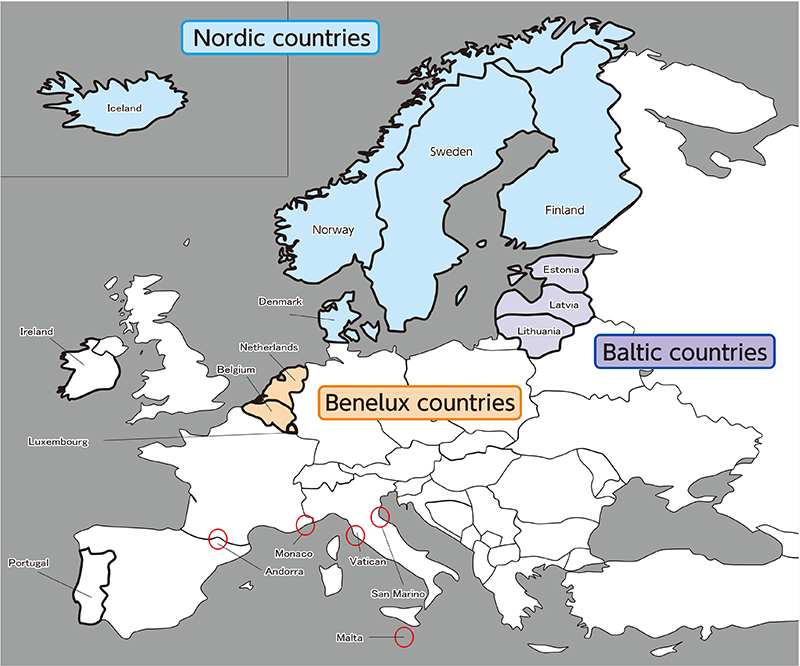
V4
Bilateral relations between Japan and the V4 countries of Slovakia, the Czech Republic, Poland, and Hungary have a long history and are traditionally friendly. Cooperation with the V4, which are neighboring countries of Ukraine and share fundamental values and principles such as freedom, democracy, rule of law, and human rights, is important. The 11th “V4+Japan” policy dialogue was held in May, where leaders reaffirmed strengthening cooperation in a wide range of fields.
Slovakia (V4 chair from July): In July, State Minister for Foreign Affairs Suzuki and State Secretary of the Ministry of Foreign and European Affairs Ingrid Brockova held talks in Switzerland to create a support framework for Ukrainian refugees and reconstruction, and confirmed cooperation in regional affairs.
Czech Republic: State Minister for Foreign Affairs Suzuki held a meeting with Deputy Minister of Foreign Affairs Jiří Kozák in Switzerland in July, and Foreign Minister Hayashi met with Foreign Minister Jan Lipavský in September during High-Level Week of the UN General Assembly. Face-to-face diplomacy with the Czech Republic, which held the presidency of the EU during the second half of 2022, has become more active, with Jan Skopeček, Deputy Speaker of the Chamber of Deputies of the Parliament of the Czech Republic attending the state funeral for late Prime Minister ABE Shinzo in September and Deputy Minister of Foreign Affairs Kozák visiting Japan in November.
Poland: *See Section 5 Europe 2 (7) Poland on page 137.
Hungary: In December, Minister of the Prime Minister's Office Gergely Gulyás, visited Japan and held talks with Chief Cabinet Secretary MATSUNO Hirokazu and Foreign Minister Hayashi. They exchanged views on the response to the situation in Ukraine and regional situations such as China and North Korea, and confirmed the importance of maintaining international order based on the rule of law.
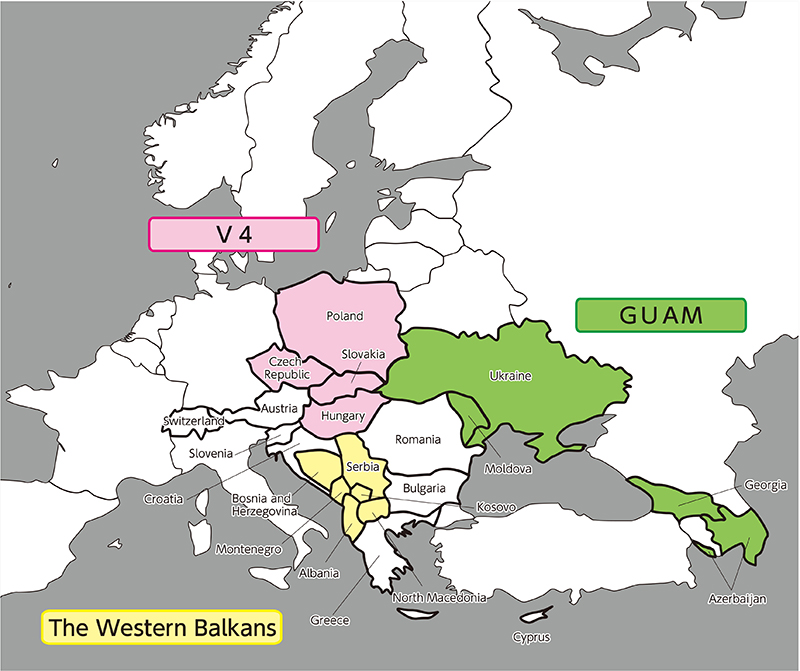
The Western Balkans
Although there still remains ethnic conflicts in the Western Balkans region, such as lingering tensions between Serbia and Kosovo, overall progress can be seen for stability and development in the Western Balkan region as each country is engaging in reforms toward EU membership. As part of the “Western Balkans Cooperation Initiative” (Note), in March, as a collaborative project with the Western Balkan Fund established by the governments of the Western Balkans, an inter-regional conference entitled “Promote Culture of Tolerance and Mutual Respect within the Region” was held with participants from each West Balkan country. Moreover, an online youth exchange was held under the theme of peacebuilding as a cooperation project with the Western Balkans Regional Youth Cooperation Office (RYCO).
Active high-level dialogue was also realized under the same initiative. In May, Foreign Minister Hayashi held talks with Foreign Minister Bujar Osmani of North Macedonia during his visit to Japan and with Minister for Europe and Foreign Affairs Olta Xhaçka of Albania during the UN General Assembly High-Level Week in September. In September, Prime Minister Kishida held talks with both Prime Minister Albin Kurti of Kosovo and Prime Minister Ana Brnabic of Serbia, who visited Japan to attend the state funeral for the late Prime Minister ABE Shinzo.
Note: In January 2018, Prime Minister Abe became the first Japanese Prime Minister to visit Serbia, where he announced the “Western Balkans Cooperation Initiative” to advance cooperation with the Western Balkan countries (Albania, Kosovo, Serbia, Bosnia and Herzegovina, North Macedonia, and Montenegro) on their path to join the EU, and promoted cooperation with the entire Western Balkan region in areas such as youth exchanges and economic exchanges.
Slovenia: In March, Prime Minister Kishida and Foreign Minister Hayashi exchanged commemorative letters to celebrate the establishment of diplomatic relations with their respective counterparts, Prime Minister Janez Jansa and Foreign Minister Anze Logar. Foreign Minister Hayashi also held a telephone call with and Foreign Minister Logar.
Romania: In February, Foreign Minister Hayashi met with Minister of Foreign Affairs Bogdan Aurescu during the G7 Foreign Ministers' Meeting in Germany. In September, Prime Minister Kishida held a summit meeting with Prime Minister Nicolae-Ionel Ciuca, who visited Japan to attend the state funeral for the late Prime Minister ABE Shinzo.
Bulgaria: Since 2018, when the first ever visit to Bulgaria by a Japanese Prime Minister was realized, bilateral cooperation has expanded into new areas under the “Western Balkans Cooperation Initiative,” and Japan promotes support to the Western Balkans in cooperation with Bulgaria in areas such as disaster prevention and the promotion of small- and medium‐sized business.
Croatia: The Government of Japan and Croatia reached an agreement in principle on the Agreement between the Government of Japan and the Government of the Republic of Croatia for Air Services in November with a view toward the 30th anniversary of the establishment of diplomatic relations in 2023 and expectations of further progress in bilateral relations, including in the economic field.
Austria: In September, consultations between authorities toward concluding a social security agreement were upgraded to government-to-government consultations, and, in December, the 24th meeting of the “Japan-Austria Committee for Issues of the Future” was held in-person for the first time in three years.
Switzerland: In April, President and Head of the Federal Department of Foreign Affairs Ignazio Cassis visited Japan, where he held a summit meeting with Prime Minister Kishida and a Foreign Ministers' Meeting with Foreign Minister Hayashi. In October, an Honorary Consulate of Switzerland was established in Fukuoka, and in November, the “Protocol Amending the Convention between Japan and Switzerland for the Avoidance of Double Taxation with respect to Taxes on Income” entered into force.
Greece: Foreign Minister Nikos Dendias visited Japan in April and had a meeting with Foreign Minister Hayashi.
Cyprus: In 2022, Japan and Cyprus celebrated the 60th anniversary of the establishment of diplomatic relations. President of the House of Representatives Annita Demetriou attended the state funeral for the late Prime Minister ABE Shinzo. Japan-Cyprus political consultation was also held, and bilateral exchanges at various levels were vitalized.
Moldova: Prime Minister Natalia Gavrilita in September and President Maia Sandu visited Japan in December to attend the state funeral for the late Prime Minister ABE Shinzo and to participate in the World Assembly for Women (WAW! 2022) respectively, and they also held a separate summit meeting with Prime Minister Kishida.
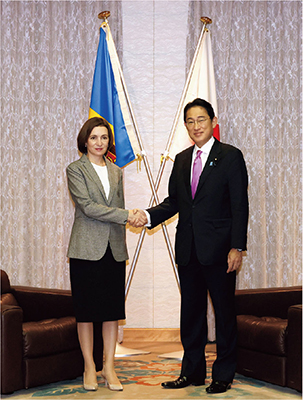 Japan-Moldova Summit Meeting (December 3, Tokyo; Photo: Cabinet Public Affairs Office)
Japan-Moldova Summit Meeting (December 3, Tokyo; Photo: Cabinet Public Affairs Office)Moldova is one of the countries of the former Soviet Union. It borders Ukraine to the east and Romania, a member of the North Atlantic Treaty Organization (NATO) and the European Union, to the west. Although Russian, which was the official language during the Soviet era, is also widely spoken in Moldova, the national language is Romanian due to the strong historical ties with Romania. Moldova became an independent country with the collapse of the former Soviet Union, but since its independence in 1989, public opinion has been divided between pro-Russia and pro-EU groups. President Igor Dodon, who served as president until 2020, was in the pro-Russia group. However, candidate Maia Sandu, who is pro-EU and anti-corruption, won the presidential election in November of the same year. In the subsequent general election held in July 2021, the Action and Solidarity Party founded by President Sandu won a working majority.
President Sandu had once served as Prime Minister in 2019. However, the pro-EU party was not a monolith, and she resigned after only five months in office back then. Thus, the results of the presidential and general elections were a long-awaited achievement for the pro-EU group led by President Sandu.
However, President Sandu and her party have since suffered hardships. First, there was the increased burden on public finances caused by COVID-19. Russia's aggression against neighboring Ukraine, which was launched in February 2022, reduced migrant labor to Russia, which until then had been an important source of income, as well as exports to the Russian and Ukrainian markets. Furthermore, Moldova depends on Russia for almost 100% of its natural gas imports. Although a gas contract with Russia was concluded after difficult negotiations, gas prices were more than six times higher as of September than in the same period a year earlier, and supplies have also been declining. Moldova's main power plant is located in Transnistria, an area where Russian troops are stationed and where the Government of Moldova has no effective control, and the power supply from this plant has also been reduced. Furthermore, there has been a massive influx of Ukrainian displaced persons, who account for more than 20% of the population of Moldova. This has resulted in a year-on-year inflation rate of more than 30% following Russia's aggression against Ukraine.
Despite facing these domestic difficulties, the Government of Moldova has maintained its course of European integration, and the international community has announced its support for the country one after another. In addition to Ukraine, Japan has also announced a variety of emergency humanitarian aid to Ukraine's neighboring countries, such as Moldova, including via Japanese NGOs through Japan Platform (JPF). A survey team was dispatched to Moldova to coordinate activities among emergency medical teams of various countries, assist with medical data management, and assess needs in the healthcare sector and other fields. Subsequently, based on the survey team's report, Japan decided to provide grant aid of up to one billion Japanese yen in the field of healthcare to alleviate the burden on the healthcare system caused by the influx of displaced persons. Furthermore, to show solidarity with Moldova, Japan changed its spelling of the capital of Moldova in Japanese from “Kishinev,” which is based on the Russian language, to “Chișinău,” which is based on the Romanian language.
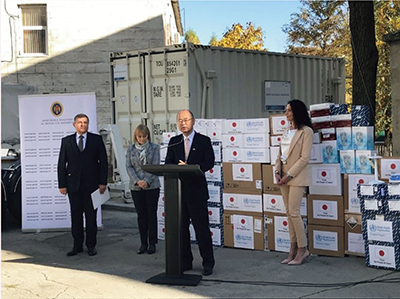 Ceremony to hand over medical equipment through the World Health Organization (WHO) as part of the Government of Japan's support for displaced persons (November 1, Chișinău, Moldova)
Ceremony to hand over medical equipment through the World Health Organization (WHO) as part of the Government of Japan's support for displaced persons (November 1, Chișinău, Moldova)Moldova applied for EU membership in March 2022, after Ukraine, and was granted EU candidate status with Ukraine in June. However, the road to accession to the EU is not smooth, with some countries taking more than 10 years to actually join.
Moldova, a country that neighbors Ukraine and has been at the mercy of history, is now on its way to accession to the EU based on fundamental values such as democracy and peace. As a responsible member of the international community, Japan is expected to be involved in providing assistance to Moldova, which has suffered the effects of Russia's aggression against Ukraine in a striking way.


